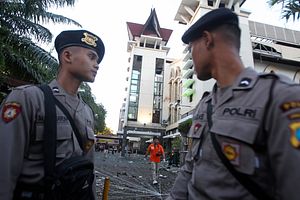Last week, Indonesian officials officially announced the capture of a top terrorist leader of the al-Qaeda offshoot group Jemaah Islamiyah (JI), along with a number of his associates. The arrests once again spotlighted the current status and future prospects of JI within the broader landscape of terrorism in Southeast Asia.
As I have noted before, while Indonesia is among the Southeast Asian states to have been hit by Islamic State-linked attacks, including in Surabaya last year, the country is no stranger to such attacks. In the 2000s, JI, regarded as the Southeast Asian offshoot of al-Qaeda, was held responsible for some of the deadliest terror attacks in the subregion, including the 2002 Bali bombings.
Though JI has been relatively dormant over the past decade in terms of attacks within Indonesia, following a spate of arrests and deaths of its leaders and members, it still remains one to watch within the Southeast Asia terror landscape. The group still spreads its ideology through educational and research institutions, its leaders continue to maintain some connections to al-Qaeda linked groups, and some members have been sent for training in the Middle East.
Earlier this month, the threat from JI was in focus again with the arrest of one of its leaders. Indonesian police announced last week that they had captured JI’s effective leader or emir, Para Wijayanto, who had been on the run since 2003, along with his wife and several other associates.
The capture of Wijayanto and his associates is itself a significant development. Though the structure and nature of JI has changed over the past few years and arrests of a few individuals should be kept in perspective, their capture does at least raise the possibility of Indonesian authorities getting a better sense for JI’s current status as well as its future prospects. Already, Indonesian officials have suggested that they have been looking into ways in which the group operates, including its financing, which comes from sources such as palm oil plantations.
But the arrest has also naturally reignited fears of JI’s future plans. In comments to media following the arrests, police spokesman Dedi Prasetyo had himself indicated that there was a connection between JI’s recruitment and training activities outside of Indonesia and the return of these people to Indonesia, which raised the potential for the group’s future revival. He added that this, combined with the group’s existing economic and military capabilities, could lead to its growth within Indonesia, following which it could be expected to officially declare a caliphate.
Whether or not that will in fact be the case remains to be seen. As it stands, JI today different group from what it was before, and it has not been directly implicated in recent terrorist attacks within Indonesia. But given the group’s past, its ongoing activities, and its still significant capabilities, it is unclear whether it will stay this way. With IS losing steam, JI’s capabilities continuing to increase, and the prospect of radicalized fighters returning to Indonesia, the chance of the group or factions of it engaging in violence in the future, as had been the case in the past, cannot be discounted. As we have seen in other countries in Southeast Asia, changing dynamics can affect how terrorism manifests itself over time.
































